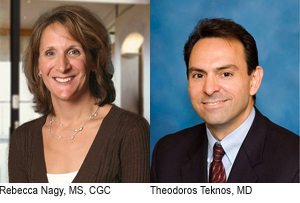
New Study Links Salivary Gland and Breast Cancers
New Study Links Salivary Gland Cancer and Breast Cancer Researchers from The Ohio State University Comprehensive Cancer Center—Arthur G. James Cancer Hospital and Richard J. Solove Research Institute (OSUCCC – James) have published a study that explores the link between
New Study Links Salivary Gland and Breast Cancers

Researchers from The Ohio State University Comprehensive Cancer Center—Arthur G. James Cancer Hospital and Richard J. Solove Research Institute (OSUCCC–James) have published a study that explores the link between salivary gland and breast cancers. While an association between the two cancers has been long suspected, this retrospective study—published in the October Journal of the American Medical Association Otolaryngology—Head and Neck Surgery—suggests that salivary gland cancer is 17 times more common in patients who inherit mutated genes BRCA1 and BRCA2, the presence of which increase the risk of breast and ovarian cancer in women, prostate and breast cancer in men, as well as pancreatic and other cancers.
The study searched a large BRCA-gene-mutation database maintained by the OSUCCC–James Clinical Cancer Genetics Program for salivary gland cancers. Out of 5,754 subjects with mutations in either the BRCA1 or BRCA2 gene, the researchers identified three cases of salivary gland cancer (0.052%).
Principal investigator Rebecca Nagy, MS, CGC, a clinical associate professor of human cancer genetics at OSUCCC–James, and study co-author Theodoros Teknos, MD, a professor and chair of the Department of Otolaryngology, director of the Division of Head and Neck Surgery, and the David E. Schuller, MD, and Carole H. Schuller chair in head and neck oncologic surgery at OSUCCC–James, believe such information is valuable to all medical professionals. While salivary gland cancer is rare, occurring in three out of 100,000 people in the United States, those with known genetic mutations BRCA1 or BRCA2 should be informed of their elevated risk.
“Physicians and dentists [should] realize that BRCA mutations carry risks for salivary gland cancer, as well as breast cancer,” notes Teknos. “Salivary glands include not only the paired parotid glands and submandibular glands, but also innumerable minor salivary glands in the oral cavity.” Teknos, who believes that further study is warranted, encourages BRCA-positive individuals to closely monitor their oral health, and suggests that “A BRCA-positive patient with a lump in a salivary gland should have the lesion evaluated as soon as possible.”
Nagy concurs, adding, “In the future, patients with salivary gland cancer and family members might be referred for BRCA testing, or carriers of BRCA mutations might undergo surveillance for salivary gland cancers.”
Hygiene Connection E-Newsletter
November 2014

